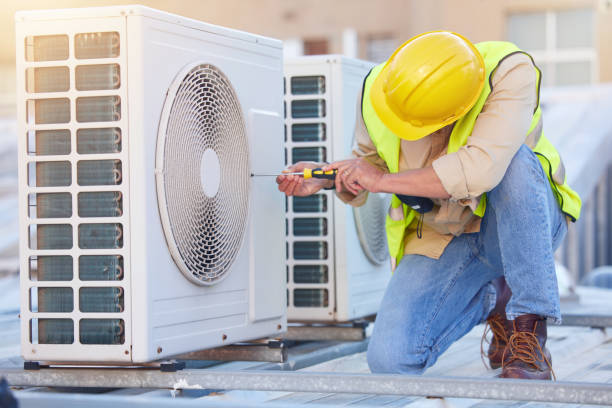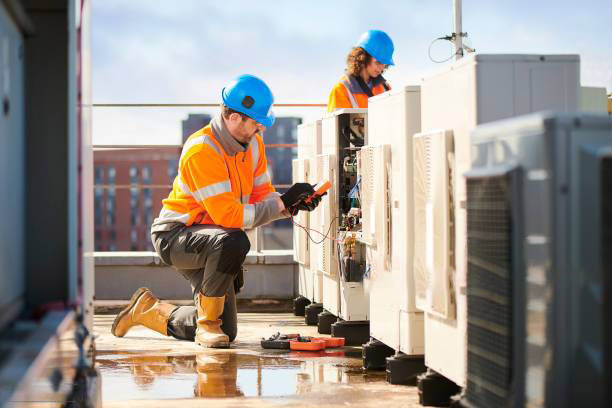Commercial HVAC Maintenance:
The Key to Efficiency and Longevity
Regular maintenance is one of the most effective ways to ensure your commercial HVAC system operates at peak performance. By scheduling routine inspections and tune-ups, you can avoid unexpected breakdowns, maintain consistent indoor temperatures, and save on energy costs. This page provides a comprehensive look at why commercial HVAC maintenance is essential and what you can expect from a professional maintenance program.
Why Commercial HVAC Maintenance Matters
- Prevent Costly Downtime
Unexpected system failures can disrupt your business and affect employee productivity. Routine check-ups help identify potential problems before they escalate into major repairs. - Boost Energy Efficiency
A well-maintained HVAC system uses less energy to heat and cool your building. This not only reduces monthly utility bills but also lowers your carbon footprint. - Extend Equipment Lifespan
Regular upkeep helps components function optimally, delaying the need for costly replacements. Over time, a well-maintained system will outlast a neglected one by several years. - Enhance Indoor Air Quality
Cleaning and replacing air filters, clearing ductwork, and inspecting ventilation systems can prevent dust and allergens from circulating through your facility. - Ensure Regulatory Compliance
Some commercial buildings must meet specific air quality or safety standards. Scheduled maintenance ensures your HVAC system remains compliant with local, state, or industry regulations.


Key Maintenance Tasks
1. Air Filter Replacement
Filters trap airborne particles like dust, allergens, and debris. Over time, clogged filters hinder airflow and force the system to work harder, reducing efficiency.
2. Coil Cleaning
Evaporator and condenser coils can accumulate dirt and grime, impeding heat exchange. Routine coil cleaning helps maintain optimal temperature control and energy efficiency.
3. Duct Inspection
Leaks or blockages in ductwork can lead to uneven heating and cooling, as well as increased energy consumption. Regular duct inspections help identify and correct issues early.
4. Thermostat Calibration
A miscalibrated or malfunctioning thermostat leads to inconsistent indoor temperatures and short cycling. Proper calibration ensures accurate temperature control.
5. Electrical & Mechanical Checks
Technicians examine wiring, belts, motors, and other components for wear or damage. Replacing these parts before failure can save you from an emergency repair down the line.
The Commercial HVAC
Maintenance Process
- Initial Assessment
A certified technician evaluates your system’s overall condition, looking for any obvious issues or worn components. - Scheduled Tune-Up
Based on the assessment, the technician performs necessary tasks such as filter changes, coil cleaning, lubrication, and calibration. - System Testing & Adjustments
After each tune-up, your technician tests airflow, temperature accuracy, and overall performance. Any final tweaks are made to optimize efficiency. - Reporting & Recommendations
You receive a detailed report outlining the work performed, system condition, and any recommended repairs or upgrades to keep your HVAC running smoothly.
Benefits of Ongoing
Maintenance Plans
Many HVAC service providers offer maintenance contracts or plans tailored to your building’s specific needs. Enrolling in a plan can bring several advantages:
- Priority Service: Enjoy faster response times in case of emergencies or sudden breakdowns.
- Cost Savings: Regular maintenance prevents large-scale failures, potentially saving you money on major repairs and replacements.
- Predictable Budgeting: Maintenance plans often come with flat rates or predictable payment schedules, allowing for easier cost management.
- Documented Service History: A comprehensive record of all maintenance, repairs, and component replacements can help validate warranties and simplify asset management.
Preventive Maintenance and Long-Term Savings
Regular HVAC maintenance is one of the best ways to prevent costly repairs. Proactive measures like filter changes, coil cleaning, and routine inspections can catch minor issues before they turn into major breakdowns. In the long run, a well-maintained system will:
- Operate more efficiently, lowering energy costs
- Last longer, reducing capital expenditures
- Maintain consistent temperatures, boosting comfort and productivity
Common Questions About Commercial HVAC Maintenance
Q: How often should I schedule maintenance?
A: Most experts recommend twice a year—once before cooling season and once before heating season. However, high-usage environments or older units may need more frequent check-ups.
Q: Can I perform some maintenance tasks myself?
A: Simple tasks like replacing filters or cleaning vents can often be done in-house. More technical tasks—like wiring checks or coil cleaning—are best left to licensed professionals.
Q: Is maintenance really worth the investment?
A: Absolutely. The cost of routine maintenance is minimal compared to the expense of major repairs or system replacements caused by neglect.
Q: Will maintenance improve indoor air quality?
A: Yes. By keeping ducts clean and ensuring filters are replaced regularly, maintenance helps reduce airborne contaminants.
Q: Can maintenance help me meet building codes and regulations?
A: In many cases, yes. Many local jurisdictions require commercial buildings to maintain HVAC units at a certain standard. Regular service ensures compliance.
When to Schedule Your Next Service
If you can’t recall your last HVAC tune-up or if you’re experiencing fluctuating temperatures, higher energy bills, or poor indoor air quality, it’s time to arrange a maintenance visit. A professional technician will thoroughly inspect your system, make any needed repairs, and provide recommendations to keep your equipment in top shape.
Ready to safeguard your commercial HVAC system?
Contact us today to book a maintenance appointment or learn more about our customizable maintenance plans.
Proactive commercial HVAC maintenance is the best strategy for preventing system failures, ensuring energy efficiency, and extending the life of your equipment. With routine check-ups, you’ll keep your facilities comfortable year-round and save money in the long run.
